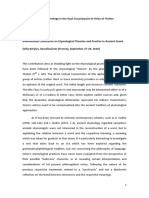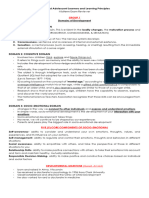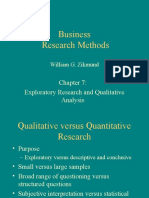Papers On Ancient Greek Linguistics
Papers On Ancient Greek Linguistics
Uploaded by
marina_70Copyright:
Papers On Ancient Greek Linguistics
Papers On Ancient Greek Linguistics
Uploaded by
marina_70Original Title
Copyright
Share this document
Did you find this document useful?
Is this content inappropriate?
Copyright:
Papers On Ancient Greek Linguistics
Papers On Ancient Greek Linguistics
Uploaded by
marina_70Copyright:
Papers on Ancient Greek Linguistics
Proceedings of the Ninth International Colloquium on
Ancient Greek Linguistics
(ICAGL 9)
30 August – 1 September 2018, Helsinki
Societas Scientiarum Fennica
The Finnish Society of Sciences and Letters
Address:
Pohjoinen Makasiinikatu 7 A 6, FI – 00130 Helsinki
In Swedish:
Finska Vetenskaps-Societeten, Norra Magasinsgatan 7 A 6, FI – 00130 Helsingfors
In Finnish:
Suomen Tiedeseura, Pohjoinen Makasiinikatu 7 A 6, FI – 00130 Helsinki
Commentationes Humanarum Litterarum
The series, founded in 1923, publishes monographs or other studies on antiquity
and its tradition.
Editor:
Prof. Mika Kajava
Address: Department of Languages, P. O. Box 24, FI – 00014 University of Helsinki.
Requests for Exchange:
Exchange Centre for Scientific Literature, Snellmaninkatu 13, FI – 00170 Helsinki,
or at the Secretary of the Society.
Distribution and Sale:
Tiedekirja, Snellmaninkatu 13, FI – 00170 Helsinki; tiedekirja@tsv.fi, www.tsv.fi.
Other series published by the Society:
Commentationes Physico-Mathematicae
Commentationes Scientiarum Socialium
Bidrag till kännedom av Finlands natur och folk
The History of Learning and Science in Finland 1828-1918
Årsbok – Vuosikirja (Yearbook), serie A sarja
Sphinx (Årsbok – Vuosikirja, serie B sarja)
Commentationes Humanarum Litterarum
139 2020
Papers on Ancient Greek Linguistics
Proceedings of the Ninth International Colloquium on
Ancient Greek Linguistics
(ICAGL 9)
30 August – 1 September 2018, Helsinki
Edited by
Martti Leiwo, Marja Vierros & Sonja Dahlgren
Societas Scientiarum Fennica
The Finnish Society of Sciences and Letters
Commentationes Humanarum Litterarum
is part of the publishing cooperation between
the Finnish Society of Sciences and Letters and
the Finnish Academy of Science and Letters
This book has received a subsidy granted by the Ministry of Education and Culture
distributed by the Federation of Finnish Learned Societies
ISSN 0069-6587 (print)
ISSN 2736-9374 (online)
ISBN 978-951-653-443-8 (print)
ISBN 978-951-653-444-5 (online)
Layout by Vesa Vahtikari
Copyright © 2020 by
Societas Scientiarum Fennica
Printed by Grano Oy, Vaasa 2020
Contents
Introduction i
Martti Leiwo, Marja Vierros & Sonja Dahldren
I Greek in contact
The accusative of respect in Homeric Greek as evidence for language 1
contact
Paola Dardano
The Greek suffix -ινδα within the Micro-Asiatic multilingual context 31
Francesco Dedè
Not overstrong in his Greek: modern interpretation of ‘Egyptian’ 43
Greek texts in the Zenon Archive
Trevor Evans
Phrasal verbs in a corpus of post-classical Greek letters from Egypt 63
Victoria Fendel
Foamy rivers and the wife of the Ocean: Greek ποταμός ‘river’, 99
Τηθῡ́ς ‘mother of all rivers’, and Proto-Indo-European *ku̯ eth2-
‘foam, seethe’ (Vedic kváth-ant- ‘foaming, seething’; Gothic
ƕaþjan* ‘to foam, ἀφρίζειν’)
Riccardo Ginevra
Greek loanwords in post-Biblical Hebrew/Aramaic: some case 111
studies from the midrash Genesis Rabbah
Christina Katsikadeli & Vladislav Slepoy
Notes on Greek loanwords in Classical Armenian 133
Daniel Kölligan
Interaction between Greek and Neo-Phrygian in funerary epigrams 157
from Eastern Phrygia under the Roman Empire
Elisa Nuria Merisio
6
Contact-induced change and language-internal factors: 177
the καὶ ἐγένετο type as a case-study
Liana Tronci
II Discourse analysis
Focus of attention and common ground. The function of the 207
particle δή in Thucydides
Rutger J. Allan
Degrés et nuances de l’acquiescement dans les dialogues de Platon 235
Frédéric Lambert
Discourse markers and text type: γάρ in Thucydides’ narrative and 259
non-narrative text sequences
Rafael Martínez
Im/politeness strategies in Euripides: an approach to linguistic 271
characterisation through qualitative data analysis
Sandra Rodríguez Piedrabuena
III Morphology and syntax
Die Anwendung des Duals bei Hesiod: Beobachtungen über seinen 301
graduellen Schwund anhand der Theogonie und der Erga
Sara Agliardi
Exclamative nominatives and nominatives pro vocatives in Greek 323
and Latin: a possible distinction?
Giulia Bucci
Reduplicated and non-reduplicated imperatives: κλύθι and κλύτε vs 337
κέκλυθι and κέκλυτε
Lucio Melazzo
The preverb μετα-: a cognitive and constructionist analysis 353
Antonio R. Revuelta Puigdollers
Comm. Hum. Litt. Vol. 139 7
Insubordination in Ancient Greek? The case of ὥστε sentences 383
Emilia Ruiz Yamuza
Lexical and syntactic constrictions for the derivation of verbal nouns 403
in –τις / -σις
Jesús de la Villa
IV Modality, semantics, and pragmatics
Modality and Injunctive in Homeric Greek: The role of epistemic 417
particles and adverbs in counterfactual constructions
Annamaria Bartolotta & Daniel Kölligan
A semantic-pragmatic analysis of the augment in epic Greek, 447
applied to some longer passages
Filip De Decker
Oblique optative and inferential evidentiality in Homer 479
Antonio Lillo
A usage-based approach to prosody and second argument realization 495
Alberto Pardal Padín
The augment in Homeric narration from a temporal perspective 509
Sira Rodeghiero
Present counterfactuals and verbal mood in the Homeric poems 529
Roxanne Taylor
Committal verbs in Greek aggressive magic: a pragmatic analysis 545
Mariarosaria Zinzi
Indices 567
List of contributors 577
Comm. Hum. Litt. Vol. 139 417
Modality and Injunctive in Homeric Greek:
The role of epistemic particles and adverbs
in counterfactual constructions
Annamaria Bartolotta & Daniel Kölligan
Structurally, unaugmented aorists and imperfects belong to the oldest layer of
verbal forms attested in Greek, which continue the so-called Indo-European
‘injunctive’. The latter was inflectionally underspecified as regards verbal categories
such as tense or mood (Hoffmann 1967; Kiparsky 1968). Thus, the question
arises as to how the attitude of the speaker toward the content of his utterance
was expressed. The aim of this paper is to investigate the role of epistemic particles
and adverbs co-occurring with injunctives in the Iliad and the Odyssey, focusing
in particular on past counterfactual constructions. Crosslinguistic studies have
shown that such modal constructions reflect the universal semantic distinction
between realis and irrealis (Wierzbicka 1997: 38). In Greek, on the one hand,
the main clause or apodosis was always lexically marked by the irrealis particle
κεν, expressing a potential event in the past, which in fact never happened (see
Hettrich 1998). On the other hand, the if-clause or protasis referred to an actual
event in the past for which the outcome is already known (realis). The data show
how particles and adverbs occurring in the protasis assumed an epistemic value,
expressing the speaker’s commitment to the truth-value or factual status of his
proposition. The analysis of all the occurrences of such complex constructions
shows a non-random distribution of those epistemic particles and adverbs, whose
frequency significantly decreases when the verb of the protasis is an indicative
rather than an injunctive. Thus, it might be argued that they played an important
role in expressing epistemic modality before the emerging indicative mood
rendered them less functional at a later stage. Another piece of evidence in favour
of this hypothesis comes from the epistemic verb μέλλω, that develops into a
periphrastic marker for future tense, especially as a future in the past (cf. Allan
2017). The Homeric poems show most instances of the unaugmented 3SG
occurring with an epistemic particle, while there is variation with the augmented
form.
You might also like
- (Current Issues in Linguistic Theory 48) Anna Giacalone Ramat, Onofrio Carruba, Giuliano Bernini (Eds.)-Papers From the 7th International Conference on Historical Linguistics-John Benjamins PublishingDocument689 pages(Current Issues in Linguistic Theory 48) Anna Giacalone Ramat, Onofrio Carruba, Giuliano Bernini (Eds.)-Papers From the 7th International Conference on Historical Linguistics-John Benjamins Publishingjgaviramarcos100% (1)
- Divine Names. A Cross-Cultural Comparison - David PorrecaDocument14 pagesDivine Names. A Cross-Cultural Comparison - David PorrecaAlito ReinaldiNo ratings yet
- A Handbook of Rhetoric and ProsodyDocument21 pagesA Handbook of Rhetoric and ProsodySampurna Pal0% (2)
- Semi Detailed Lesson Plan ObservationDocument3 pagesSemi Detailed Lesson Plan ObservationJohn Paul Mangalus100% (6)
- Verbal Hygiene by D CameronDocument2 pagesVerbal Hygiene by D CameronNandini1008No ratings yet
- Modality and Injunctive in Homeric Greek (Bartolotta & Kölligan)Document36 pagesModality and Injunctive in Homeric Greek (Bartolotta & Kölligan)mariomb36No ratings yet
- Papers On Ancient Greek Linguistics - Finnish Society (2018)Document595 pagesPapers On Ancient Greek Linguistics - Finnish Society (2018)mariomb36No ratings yet
- Bartolotta&Kölligan 2018 Modality&InjunctiveDocument2 pagesBartolotta&Kölligan 2018 Modality&Injunctivemarina_70No ratings yet
- The philosophy of etymology in the Περὶ ἐτυμολογιῶν of Orion of Thebes - Chriti + 2018Document7 pagesThe philosophy of etymology in the Περὶ ἐτυμολογιῶν of Orion of Thebes - Chriti + 2018krenari68No ratings yet
- The Study of Greek: Part SixDocument15 pagesThe Study of Greek: Part SixANUGIL VNo ratings yet
- Mantic Perspectives Krzysztof BielawskiDocument16 pagesMantic Perspectives Krzysztof Bielawskimohammad sobhaniNo ratings yet
- BMCR CR LogozzoDocument6 pagesBMCR CR LogozzoBrian Z EdenyNo ratings yet
- 2013lit Intro2Document16 pages2013lit Intro2Poulami MukherjeeNo ratings yet
- (Amsterdam Studies in Classical Philology 30) Albert Rijksbaron_ Rutger J. Allan, Evert van Emde Boas, Luuk Huitink - Form and Function in Greek Grammar_ Linguistic Contributions to the Study of GreekDocument447 pages(Amsterdam Studies in Classical Philology 30) Albert Rijksbaron_ Rutger J. Allan, Evert van Emde Boas, Luuk Huitink - Form and Function in Greek Grammar_ Linguistic Contributions to the Study of GreekIchtusNo ratings yet
- Studies in Ancient Greek Dialects From Central Greece To The Black Sea 9783110532135 9783110530810 CompressDocument618 pagesStudies in Ancient Greek Dialects From Central Greece To The Black Sea 9783110532135 9783110530810 CompressPetar B. BogunovicNo ratings yet
- (Javier E. Díaz-Vera) Metaphor and Metonymy AcrosDocument356 pages(Javier E. Díaz-Vera) Metaphor and Metonymy AcrosRahma Luttifah100% (1)
- Myth & Symbol IDocument332 pagesMyth & Symbol Ismaragda2007100% (3)
- AbstractsDocument31 pagesAbstractsTeodore BundyNo ratings yet
- 50Document9 pages50Mysha ZiaNo ratings yet
- Warren, Corti, Olfert - Pyrrhonian Skepticism in Diogenes LaertiusDocument36 pagesWarren, Corti, Olfert - Pyrrhonian Skepticism in Diogenes LaertiusfeliandreNo ratings yet
- Levels of Style in Byzantine Greek and T PDFDocument29 pagesLevels of Style in Byzantine Greek and T PDFMarina KuresevicNo ratings yet
- Myrto Garani - Andreas N. Michalopoulos - Sophia Papaioannou - Intertextuality in Seneca's Philosophical WritingsDocument284 pagesMyrto Garani - Andreas N. Michalopoulos - Sophia Papaioannou - Intertextuality in Seneca's Philosophical WritingsMaria Victoria CoceNo ratings yet
- Ancient Philosophers On Language in Col PDFDocument12 pagesAncient Philosophers On Language in Col PDFJo Gadu100% (1)
- MASTRONARDE Euripidean Tragedy & TheologyDocument60 pagesMASTRONARDE Euripidean Tragedy & Theologymegasthenis1No ratings yet
- Encyclopedia of Ancient Greek Language and Linguistics: P-Z, IndexDocument6 pagesEncyclopedia of Ancient Greek Language and Linguistics: P-Z, IndexPsaxtisNo ratings yet
- On Looking Into Words and BeyondDocument628 pagesOn Looking Into Words and BeyondNguyễn Hoài Anh ThưNo ratings yet
- Studies in Greek Lexicography - Ed. Georgios K. Giannakis, Christoforos Charalambakis, Franco Montanari and Antonios RengakosDocument347 pagesStudies in Greek Lexicography - Ed. Georgios K. Giannakis, Christoforos Charalambakis, Franco Montanari and Antonios RengakosEusebius325No ratings yet
- Etymology and Magic Yāska's Nirukta, Plato's Cratylus, and The Riddle of SemanticDocument58 pagesEtymology and Magic Yāska's Nirukta, Plato's Cratylus, and The Riddle of SemanticLangravio Faustomaria PanattoniNo ratings yet
- A Handbook of Rhetoric and ProsodyDocument23 pagesA Handbook of Rhetoric and ProsodyLal Babu singh100% (1)
- On The Dialectical Character of Antisthenes' Speeches Ajax and OdysseusDocument25 pagesOn The Dialectical Character of Antisthenes' Speeches Ajax and Odysseusvladislav suvakNo ratings yet
- Greek Divination From Anamerindian PerspectiveDocument25 pagesGreek Divination From Anamerindian PerspectivegabyNo ratings yet
- Reading The Proemium of Plato's: Theaetetus: Euclides in ActionDocument28 pagesReading The Proemium of Plato's: Theaetetus: Euclides in ActionCatalina MárquezNo ratings yet
- Eidos and Dynamis The Intertwinement ofDocument342 pagesEidos and Dynamis The Intertwinement ofRadovan TrifunovNo ratings yet
- Cornelius Castoriadis - The Greek Imaginary - From Homer To Heraclitus, Seminars 1982-1983-Edinburgh University Press (2023)Document336 pagesCornelius Castoriadis - The Greek Imaginary - From Homer To Heraclitus, Seminars 1982-1983-Edinburgh University Press (2023)Nicole Hart100% (1)
- SLE 2022 List of Accepted Papers 1Document21 pagesSLE 2022 List of Accepted Papers 1Liliana HoinarescuNo ratings yet
- Where Can Buy Usque Ad Radices Indo European Studies in Honour of Birgit Anette Olsen Bjarne Simmelkjær (Editor) Ebook With Cheap PriceDocument49 pagesWhere Can Buy Usque Ad Radices Indo European Studies in Honour of Birgit Anette Olsen Bjarne Simmelkjær (Editor) Ebook With Cheap Priceboffadussex100% (5)
- Carol Poster The Task of The BowDocument22 pagesCarol Poster The Task of The BowEnrique HulszNo ratings yet
- Why Did Phobos Mean PhygeDocument7 pagesWhy Did Phobos Mean PhygemihNo ratings yet
- Homeric Speech and The Origins of Rhetoric - Rachel Ahern KnudsenDocument243 pagesHomeric Speech and The Origins of Rhetoric - Rachel Ahern Knudsenjamesilluminare100% (1)
- ALLEN (Marsilio Ficino On Signi Catio) PDFDocument14 pagesALLEN (Marsilio Ficino On Signi Catio) PDFRodrigo BraicovichNo ratings yet
- Van Emde Boas EH - The Linguistic Characterization of Oedipus in OTDocument29 pagesVan Emde Boas EH - The Linguistic Characterization of Oedipus in OTevertvebNo ratings yet
- Crystal D LInguistics PDFDocument6 pagesCrystal D LInguistics PDFLocusSNo ratings yet
- The Methodological Dimension of Antisth PDFDocument20 pagesThe Methodological Dimension of Antisth PDFdefreitasJHNo ratings yet
- Change of Paradigms - New Paradoxes Recontextualizing Language and Linguistics (Etc.)Document399 pagesChange of Paradigms - New Paradoxes Recontextualizing Language and Linguistics (Etc.)NatalieNo ratings yet
- Sarischouli - Hope For Cure and The Placebo Effect - FMDocument35 pagesSarischouli - Hope For Cure and The Placebo Effect - FMPanagiota SarischouliNo ratings yet
- Task of The Bow: Heraclitus' Rhetorical Critique of Epic LanguageDocument22 pagesTask of The Bow: Heraclitus' Rhetorical Critique of Epic LanguagedugNo ratings yet
- Dickey, Forms of Address and Conversational Language in Aristophanes and MenanderDocument16 pagesDickey, Forms of Address and Conversational Language in Aristophanes and MenanderAntonis PetridesNo ratings yet
- History - An Overview of Classical Rhetoric 1 PDFDocument4 pagesHistory - An Overview of Classical Rhetoric 1 PDFBryant Patrick Dela CruzNo ratings yet
- Marazzi - FS Poettol PDFDocument30 pagesMarazzi - FS Poettol PDFmasmarazziNo ratings yet
- Darnton - Symbolic - CopiarDocument18 pagesDarnton - Symbolic - CopiarMaria Gómez RondónNo ratings yet
- Are We A Conversation Hermeneutics, Exteriority, and Transmittability Theodore George 2017Document20 pagesAre We A Conversation Hermeneutics, Exteriority, and Transmittability Theodore George 2017guoguo1800 chenNo ratings yet
- M. R. Wright - Introducing Greek Philosophy-Acumen (2009)Document253 pagesM. R. Wright - Introducing Greek Philosophy-Acumen (2009)MopsoNo ratings yet
- Sabda Brahma: Science and Spirit of Language in Indian CultureDocument21 pagesSabda Brahma: Science and Spirit of Language in Indian Culturesunil sondhiNo ratings yet
- Magia-Retrca WardDocument63 pagesMagia-Retrca WardzagohuNo ratings yet
- Fabian ArchivesDocument12 pagesFabian ArchivesPatrice SchuchNo ratings yet
- Oedipus The King Notes IB EnglishDocument27 pagesOedipus The King Notes IB Englishdkuatov45No ratings yet
- Gellrich, Socratic MagicDocument34 pagesGellrich, Socratic MagicmartinforcinitiNo ratings yet
- Women's Speech in Greek Tragedy: The Case of Electra and Clytemnestra in Euripides' "Electra"Document12 pagesWomen's Speech in Greek Tragedy: The Case of Electra and Clytemnestra in Euripides' "Electra"AlyssaNo ratings yet
- A Cognitive Semiotic Approach To Sound SymbolismDocument51 pagesA Cognitive Semiotic Approach To Sound SymbolismJacek TlagaNo ratings yet
- Light and Darkness in Ancient Greek Myth and ReligionFrom EverandLight and Darkness in Ancient Greek Myth and ReligionMenelaos ChristopoulosNo ratings yet
- EducationDocument30 pagesEducationsiddique_430% (1)
- New Microsoft PowerPoint Presentation On DSTDocument11 pagesNew Microsoft PowerPoint Presentation On DSTsanskriti mudaliarNo ratings yet
- Lec 2 NotesDocument3 pagesLec 2 NotesChai AmandaNo ratings yet
- Social LiteracyDocument12 pagesSocial LiteracyJenelyn L. MalintadNo ratings yet
- Test Overview ISE III (C1)Document6 pagesTest Overview ISE III (C1)Jeremy KelmanNo ratings yet
- Componential AnalysisDocument16 pagesComponential AnalysisbutterflycOught57% (7)
- Learning NotesDocument6 pagesLearning NotesRatih RinandaNo ratings yet
- Notes On Piaget & Inhelder's Formal Operational Stage As A "Messianic Stage"Document6 pagesNotes On Piaget & Inhelder's Formal Operational Stage As A "Messianic Stage"THE FRENCHY FRY'S SHOWNo ratings yet
- FR2202 Financial EconometricsDocument3 pagesFR2202 Financial Econometricscarwasher1No ratings yet
- Cad Reviewer FinalismDocument15 pagesCad Reviewer FinalismcaradeulliesNo ratings yet
- 37 Emotional Benefits To Use in MarketingDocument4 pages37 Emotional Benefits To Use in MarketingjwestiusNo ratings yet
- Simple Complex CompoundDocument7 pagesSimple Complex CompoundMahruf Alam Saad0% (1)
- Generative Adversarial Networks in Time Series: A Systematic Literature ReviewDocument31 pagesGenerative Adversarial Networks in Time Series: A Systematic Literature Reviewklaus peterNo ratings yet
- Literature ReviewDocument3 pagesLiterature ReviewXuan ThanhNo ratings yet
- NACINOPA - FS 1 Learning Episode 5Document11 pagesNACINOPA - FS 1 Learning Episode 5Rolando Nacinopa Jr.No ratings yet
- QuestionnairesDocument2 pagesQuestionnairesDexie FerolinoNo ratings yet
- Business Research Methods: Exploratory Research and Qualitative AnalysisDocument30 pagesBusiness Research Methods: Exploratory Research and Qualitative AnalysisswathravNo ratings yet
- Sol Therese Cairel Ippd 2017Document10 pagesSol Therese Cairel Ippd 2017sol therese cairelNo ratings yet
- FALLSEM2022-23 SWE1011 EPJ VL2022230101204 Review I Material Review 1 SWE1011 Soft Computing Project1Document22 pagesFALLSEM2022-23 SWE1011 EPJ VL2022230101204 Review I Material Review 1 SWE1011 Soft Computing Project1abhishek asgolaNo ratings yet
- Human Resource Management: Comprehensive Study Program To Adopt Management Information System (MIS)Document10 pagesHuman Resource Management: Comprehensive Study Program To Adopt Management Information System (MIS)Er Akshay BhargavaNo ratings yet
- NCLEX True or False QuestionsDocument2 pagesNCLEX True or False Questionsdavidvpn100% (2)
- Natural Language ProcessingDocument57 pagesNatural Language Processingআশফাকুর রহমান আরজুNo ratings yet
- Lesson 3Document7 pagesLesson 3Marlon BenaventeNo ratings yet
- Documentation AnalysisDocument4 pagesDocumentation AnalysisJamila AbdulganiNo ratings yet
- Journal Using Articles in EssaysDocument7 pagesJournal Using Articles in EssaysHenryNo ratings yet
- Can I Have Your Attention - How To Think Fast, Find Your Focus, and Sharpen Your Concentration (PDFDrive)Document130 pagesCan I Have Your Attention - How To Think Fast, Find Your Focus, and Sharpen Your Concentration (PDFDrive)Manel PaivaNo ratings yet
- 05 Task Performance 12Document2 pages05 Task Performance 12Irold SanchezNo ratings yet
- Cambridge ELT NZD Prices ListDocument60 pagesCambridge ELT NZD Prices ListmuhanadNo ratings yet

























































































